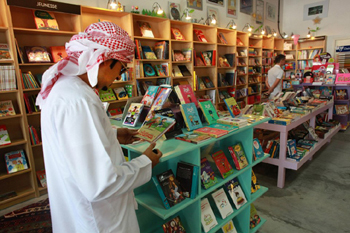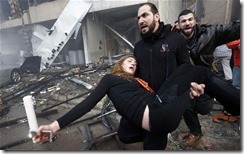Wars, conquests, collective violence, and all kinds of forms of domination and oppression are justified through specific rhetorical strategies, or ideologies.
Take a very recent epoch, the one that was dubbed the ‘modern age’ that starts roughly with European ‘enlightenment’ and is still unfolding today. This is an epoch that sees the development and consolidation of States with their invented National histories, an epoch where capitalist economic and social changing structures have been nurtured by evermore centralized poles of power and more rigid notions of self. This epoch has seen the rise of a discourse of human rights, ‘rights’ people had, claims they could make on the past, on territory, and even on other people (teaching democracy for example).
Israel represents one little (but oh so deadly) experiment of applying national theory to practice from scratch. It is the quintessence of modern culture: believing in an idea that fathoms a history for a people, projects it on a territory and then consolidates State structures to the detriment of previous social and economic structures in place. In a way Israel is the Frankenstein of the West. It is the horrible result of an experiment where the idea that some ‘ideational’ link with some representation of the past can materialize in ‘reality’, indeed, should, or has a ‘right to’ materialize in reality.
In this sense another type of colonial practice is born with Israel. We could probably talk of a classical colonialism that Europe and to some extent the US practiced, consisting in occupying and seizing the means of production of a specific area (Latin America, Africa, India, etc.). But the new colonialism is one that exist side by side a perpetual condemnation of colonialism. The new colonialism exists in the age of NGOs, UN, and other international institutions that legitimates the occupation and oppression of the ‘uncivilized’. New colonialism is practiced mainly by the US and Israel today and consist in subverting the average person into believing that there are ‘security’ questions to address in order to protect the ‘rights’ of certain political entities.
Several times Talal Asad’s quote at the right top end of this blog has been criticized. But it still holds so well today. War by the ‘civilized’ is much more couched in a moral rhetoric that legitimates it and makes it more deadly. Trabulsi in Al Safir today argues that one such legitimating tool is the concept of “Security”. In this excellent article, Trabulsi showed how Israel and the US succeeded in imposing the notion of ‘security’ as a ‘reason of State’ in order to clamp down on any insurgency effort fighting their occupier. Trabulsi shows also how Arab states, especially Egypt and Saudi Arabia, caught onto this program and gradually switched from a discourse centralized on Palestinian (or say local population) demands to one of imposing security to the benefit of Israel so as to resolve and neutralize the Palestinian question.
I want to develop a couple of points Trabulsi makes in his article. The ‘security’ rationale is very perverse in several ways. First it ignores the fact that insurgents, fighters, resistance groups etc, have longstanding political demands which makes them do what they do when they do it. By this token it refuses to address these demands. Also, the Security rationale sanctifies (and goes fully in line with) a discourse on liberal values in the sense that it is only fair that Israel is a ‘legitimate’ entity that needs to ‘protect’ itself. Protection defined as such may justify the killing of civilians, in a different way than say ‘terrorist’ practices do. Terrorists have nothing to protect. They are out of a discourse of human rights. They are evil incarnate. Falling outside the hegemonic makes you unrecoverable.
A discourse of human rights sanctifies and makes it possible for this political Frankenstein to exist. The question to ask is when does the Palestinian question fall within a discourse on human right (which would then only make it a legitimate claim ‘respected’ by the West) and when does it fall outside of it? The politically dominant strives to push it outside of the ‘civilized’ discourse in order to legitimizes more killing while the world looks at it oblivious because it becomes ‘logical’ that Israel or someone else acts this way. You can kill much more recklessly when you are on the side of liberalism.
One sad point here is that the Palestinian question will only acquire saliency when it fully complies with this discourse, something most western-educated Palestinians or pro-Palestinians strive to achieve. One will always look at Hamas with ‘reservation’ because at the end of the day Hamas is not inscribed in this discourse, neither through its claims (calling for the destruction of Israel) nor through its practices (hitting ‘civilian’ targets). That is the biggest tragedy. One cannot actually make a case that Israel as a political entity with the history it projects should be destroyed. Or maybe one can, but it will take a lot of other subverting strategies. And weapons, lots of them…
For now Islamic movements are not revolutionary enough at the political level. They have to extirpate themselves from a discourse of human rights. Their use of ‘religion’, and their practice of piety is a good place to start. We need to go back to a discourse of human ‘roles’. Away from morals and into ethics…



